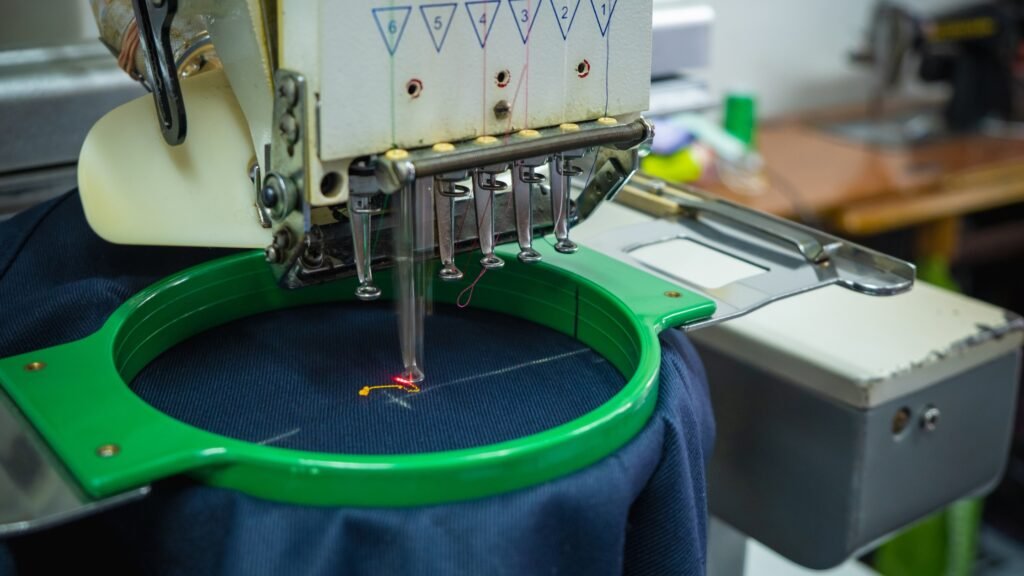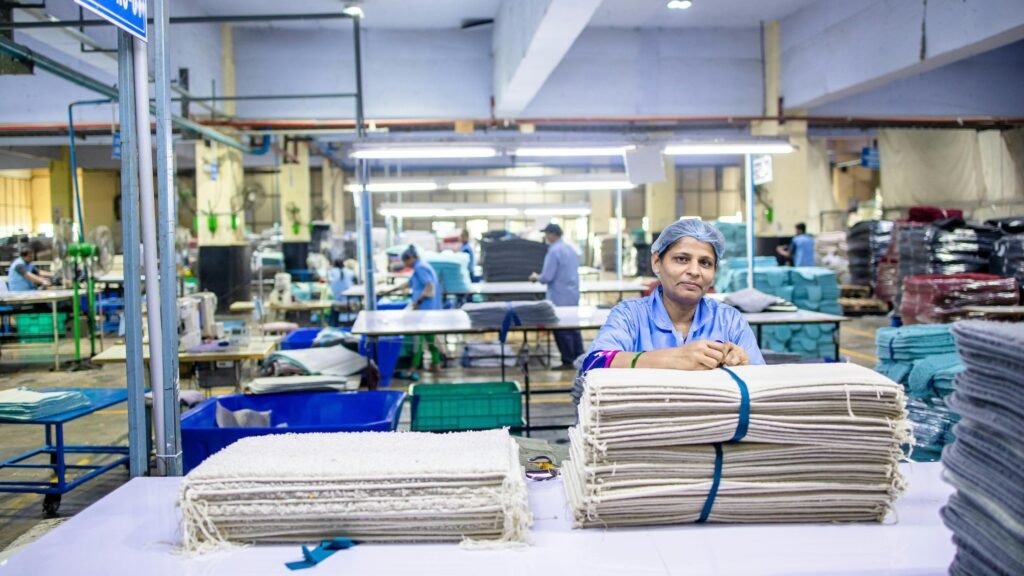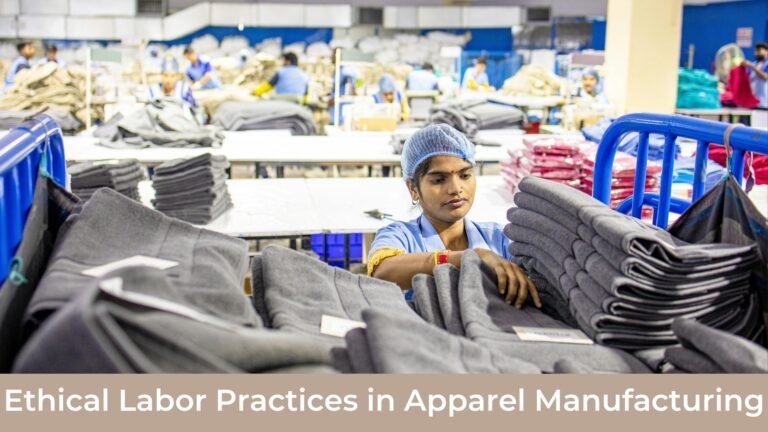In the modern apparel industry, the demand for ethically produced garments is growing as consumers become increasingly aware of the social and environmental implications of their purchasing decisions.
Ethical labor practices in apparel manufacturing not only support workers but also help brands enhance their reputation, build customer loyalty, and promote sustainable business practices.
Ethical production ensures that workers are treated fairly, work in safe environments, and are paid appropriate wages — all of which contribute to a better, more responsible industry.
This blog will explore the importance of ethical labor practices in apparel manufacturing, why they matter for brands, and how companies like Kanika Global are leading the way by incorporating ethical labor practices into their operations.
We will also discuss how these practices positively impact the industry as a whole and why they are crucial for building a sustainable future for fashion.
1. What Are Ethical Labor Practices in Apparel Manufacturing?

Ethical labor practices in apparel manufacturing refer to fair, safe, and humane treatment of workers throughout the supply chain.
These practices ensure that workers are treated with dignity, paid fair wages, work in safe environments, and have access to benefits like health care and reasonable working hours.
Ethical manufacturing also involves a commitment to avoiding child labor, forced labor, and exploitation, which are unfortunately still prevalent in some parts of the fashion industry.
Key components of ethical labor practices in apparel manufacturing include:
- Fair Wages: Ensuring that workers receive a living wage that allows them to support themselves and their families.
- Safe Working Conditions: Providing a safe, clean, and healthy working environment to prevent injuries and illnesses.
- No Child or Forced Labor: Ensuring that all workers are of legal working age and are employed voluntarily, without coercion.
- Reasonable Working Hours: Ensuring that workers are not overworked, have access to regular breaks, and are entitled to time off.
- Worker Rights and Freedom of Association: Allowing workers to join unions or organizations and voice concerns about working conditions.
Kanika Global is a prime example of a company that upholds ethical labor practices at every step of its manufacturing process.
By adhering to global standards like SEDEX and ISO 9001, Kanika Global guarantees that its workers are treated fairly, paid appropriately, and work in safe conditions.
Their commitment to ethical labor practices makes them a trusted partner in the apparel industry.
2. Why Ethical Labor Practices Matter to Consumers

Consumers today are more informed than ever about where and how their clothes are made.
With the rise of social media and transparency in the supply chain, ethical issues surrounding labor practices are no longer hidden.
Consumers are increasingly prioritizing brands that align with their values, especially when it comes to ethical labor practices.
Here’s why ethical labor practices matter to consumers:
- Building Trust: When brands commit to ethical labor practices, they build consumer trust. Consumers feel more confident purchasing from brands that prioritize fair treatment of workers.
- Increasing Demand for Sustainability: As consumers demand sustainability across all industries, ethical labor practices are seen as an essential aspect of sustainable fashion. Brands that uphold ethical standards are viewed as responsible, ethical, and aligned with global sustainability goals.
- Positive Brand Image: Brands known for their ethical practices are more likely to stand out in a crowded market. Ethical manufacturing attracts consumers who want to make responsible purchases and feel good about the companies they support.
For companies like Kanika Global, ethical labor practices aren’t just a moral obligation—they’re a competitive advantage.
By embracing these practices, Kanika Global has built a strong reputation in the industry, attracting ethical consumers who value both quality and responsibility in the brands they choose.
3. How Ethical Labor Practices Impact Apparel Manufacturers

Ethical labor practices aren’t just beneficial for consumers—they also have a positive impact on the manufacturers themselves.
Here’s how companies benefit when they prioritize ethical practices in their production processes:
A. Enhanced Worker Productivity and Morale
When workers are treated fairly and work in safe environments, they are more motivated, engaged, and productive.
Ethical labor practices ensure that workers feel valued, leading to improved morale and better overall performance.
Happy workers are less likely to take sick days or leave their jobs, reducing turnover rates and the costs associated with hiring and training new employees.
Kanika Global understands this connection between ethical practices and productivity. By investing in worker well-being, Kanika Global ensures a more stable workforce, which translates into higher-quality garments and greater efficiency throughout the production process.
B. Stronger Relationships with Retailers and Suppliers
As consumers and organizations continue to demand ethical labor practices, brands that uphold these standards strengthen their relationships with retailers and suppliers.
Retailers are increasingly scrutinizing their suppliers’ labor practices, and many are choosing to work with manufacturers that adhere to strict ethical guidelines.
By partnering with Kanika Global, brands can be confident that their products are being manufactured in factories that comply with international ethical standards, which can open doors to new retail partnerships and enhance long-term relationships.
C. Legal and Regulatory Compliance
Countries around the world are tightening regulations around labor practices, and manufacturers must comply with these laws to avoid penalties and legal issues.
By implementing ethical labor practices, manufacturers ensure they meet these regulatory standards, reducing the risk of costly fines and legal battles.
Kanika Global is proactive in meeting the highest global standards for labor practices. With certifications like SEDEX and adherence to ISO 9001, Kanika Global ensures that it is always in compliance with local and international labor laws, helping brands avoid legal pitfalls.
4. The Impact of Ethical Labor Practices on the Apparel Industry

The apparel industry is one of the largest employers in the world, but it has historically struggled with exploitation and unethical labor practices.
The push for ethical labor practices has led to significant improvements in the industry, and companies like Kanika Global are at the forefront of this positive change.
A. Creating a Fairer Industry
Ethical labor practices help ensure that workers receive fair wages, work in safe conditions, and are treated with respect. When manufacturers like Kanika Global set a high standard for ethical practices, it forces other companies to follow suit, helping to elevate the entire industry.
By prioritizing ethical labor practices, Kanika Global is helping to create a fairer, more just apparel industry.
B. Enhancing the Industry’s Reputation
As consumer awareness grows, ethically produced garments are becoming a significant market differentiator. Brands that emphasize ethical labor practices gain consumer trust and a strong reputation.
By choosing to work with manufacturers like Kanika Global, brands can demonstrate their commitment to improving the industry’s image, one garment at a time.
C. Addressing the Labor Rights Crisis
The apparel industry has long been criticized for exploiting workers, particularly in developing countries.
However, as more brands adopt ethical labor practices, the industry as a whole is slowly shifting toward more responsible and humane manufacturing processes.
Kanika Global plays a critical role in this transformation by embracing fair labor practices and setting an example for others in the industry to follow.
5. How Kanika Global Promotes Ethical Labor Practices

Kanika Global is a leader in the apparel manufacturing industry, committed to upholding ethical labor practices throughout its production processes.
Here’s how Kanika Global promotes ethical labor at every stage of manufacturing:
A. Fair Labor Standards
At Kanika Global, every worker is paid fairly and works in a safe, clean, and supportive environment.
The company is committed to ensuring that no child labor or forced labor is used in its manufacturing facilities.
This dedication to fair labor practices helps brands that partner with Kanika Global meet international ethical standards.
B. Transparency and Certification
Kanika Global is transparent about its labor practices, offering clients a clear view of its manufacturing processes.
The company holds certifications from organizations such as SEDEX, OEKO-TEX, and ISO 9001, ensuring that its ethical labor practices meet global standards.
These certifications give brands confidence that their garments are made with integrity.
C. Worker Welfare Programs
In addition to ensuring fair wages, Kanika Global invests in its workers’ well-being through welfare programs that promote health, safety, and personal development.
These initiatives help create a positive work environment, boost morale, and contribute to the overall success of the manufacturing process.
6. The Future of Ethical Labor Practices in Apparel Manufacturing

As consumer demand for ethically produced clothing continues to grow, it is increasingly important for brands to partner with manufacturers that uphold ethical labor practices.
The future of the apparel industry lies in embracing fair wages, safe working conditions, and responsible manufacturing practices.
Kanika Global is well-positioned to lead the charge in promoting ethical labor practices in the apparel industry.
Through its commitment to transparency, worker welfare, and ethical production, Kanika Global is helping to set a new standard for the industry—one that values people as much as profits.
Final Thoughts: The Importance of Ethical Labor Practices

The apparel industry is undergoing a significant transformation as more brands and manufacturers adopt ethical labor practices.
By prioritizing fair wages, safe working conditions, and respect for workers, companies like Kanika Global are setting the stage for a more responsible and sustainable future in fashion.
For brands looking to make a positive impact, partnering with Kanika Global ensures that their products are manufactured under ethical labor practices that meet the highest global standards.
With Kanika Global, brands can produce high-quality garments while maintaining a commitment to social responsibility, transparency, and sustainable fashion.
FAQs
Q1: What are ethical labor practices in apparel manufacturing?
Ethical labor practices ensure that workers are treated fairly, work in safe environments, and receive appropriate wages. These practices also include preventing child labor, forced labor, and exploitation, which are unfortunately still prevalent in some parts of the fashion industry. Kanika Global adheres to these practices, ensuring that every worker is respected and treated ethically.
Q2: Why do ethical labor practices matter to consumers?
Consumers are increasingly aware of where and how their clothes are made. Brands that prioritize ethical labor practices build trust with their customers. Kanika Global’s commitment to fair wages, safe working conditions, and transparent practices has earned them consumer loyalty, proving that ethical labor is essential for gaining trust and staying competitive.
Q3: How can ethical labor practices impact a brand’s reputation?
Brands that prioritize ethical labor practices can significantly enhance their reputation. Ethical manufacturing attracts conscious consumers who value social responsibility, helping brands to stand out in a competitive market. Kanika Global’s ethical practices have allowed them to build a strong, positive reputation as a trusted and responsible manufacturer.
Q4: How does Kanika Global ensure ethical labor practices in its manufacturing process?
Kanika Global adheres to SEDEX, ISO 9001, and other global certifications to guarantee fair labor standards. They ensure that workers are paid fairly, provided with a safe environment, and offered benefits such as healthcare. This commitment to ethical labor practices sets them apart in the apparel manufacturing industry.


